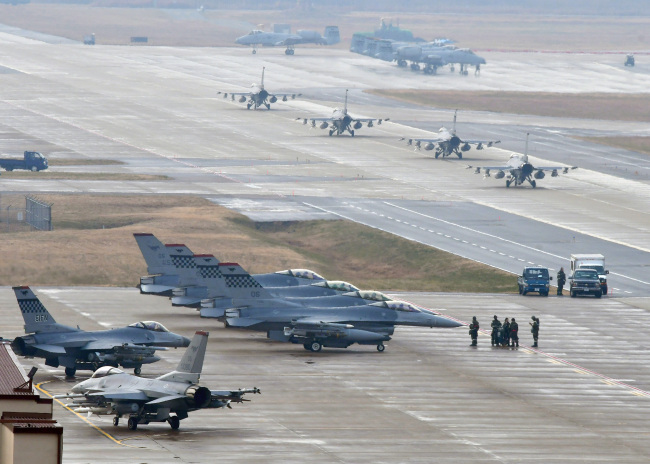Pushing back joint South Korea-US military drills until after the 2018 PyeongChang Winter Olympics and Paralympic Games is worth considering, said former commanders of US Forces Korea in a Voice of America report Wednesday.
 |
US warplanes on standby during the Vigilant Ace South Korea-US joint air drill held from Dec. 4 to Dec. 8. Yonhap |
The idea of postponing joint drills that coincide with the games was first publicly raised by President Moon Jae-in during an interview with US broadcaster NBC on Dec. 19. The Winter Olympics will take place from Feb. 9 to Feb. 25 and the Paralympics from March 9 to March 18. Seoul and Washington are reportedly discussing possible options in changing the dates of the Key Resolve and Foal Eagle exercises.
Speaking to VOA, Burwell Bell, a retired US Army general who served as the USFK commander from 2006 to 2008, said that carrying out drills during the games is undesirable.
Bell, however, stressed that the drills should be carried out immediately after the games, and that military readiness cannot be a tool in negotiating with North Korea.
“Any notion by anyone that exercises should be postponed to achieve some kind of diplomatic engagement is wrong. I agree they could be postponed for (a) very short period of time so as to accommodate the conducts of the Olympics, but it is crucial that those exercises be conducted to their full range of requirements immediately following the Olympics,” Bell was quoted as saying by VOA.
Should the allies compromise their military readiness to deal with Pyongyang, troops and citizens of the two countries would be put in danger, Bell said, adding that he would then advise the US to end the alliance.
Bell also said that until China takes a more active role, war is the only option the US has in preventing North Korea from becoming capable of carrying out a pre-emptive nuclear strike.
“Quite frankly, until China decides that is in their best interests for the North to give up their nuclear weapons, nothing we can do short of going to war will stop the North’s efforts to gain nuclear first strike capability. This is in China’s hands.”
Similar views were echoed by Bell’s predecessors James Thurman and John Tilelli.
Thurman, who held the post from 2011 to 2013, told VOA that he thinks that changing the dates of the drills should be considered. Thurman, however, warned that North Korea must not be allowed to take possible changes in the dates as signs that the allies are trying to appease the regime, saying that such measures have failed in the past.
“I think the exercises are essential to maintaining the required readiness to defend the peninsula and to protect the South Korean people,” Thurman said.
“If North Korea is interested in reducing tensions, they need to quit launching and testing ballistic missiles and denuclearize. The military drills are necessary to maintaining the readiness required by the alliance.”
Tilelli, who led the USFK between 1996 and 1999, also said that there may be value in delaying the drills, but emphasized that joint drills are central to the allies’ military readiness.
By Choi He-suk (
cheesuk@heraldcorp.com)





![[Herald Interview] 'Trump will use tariffs as first line of defense for American manufacturing'](http://res.heraldm.com/phpwas/restmb_idxmake.php?idx=644&simg=/content/image/2024/11/26/20241126050017_0.jpg)


